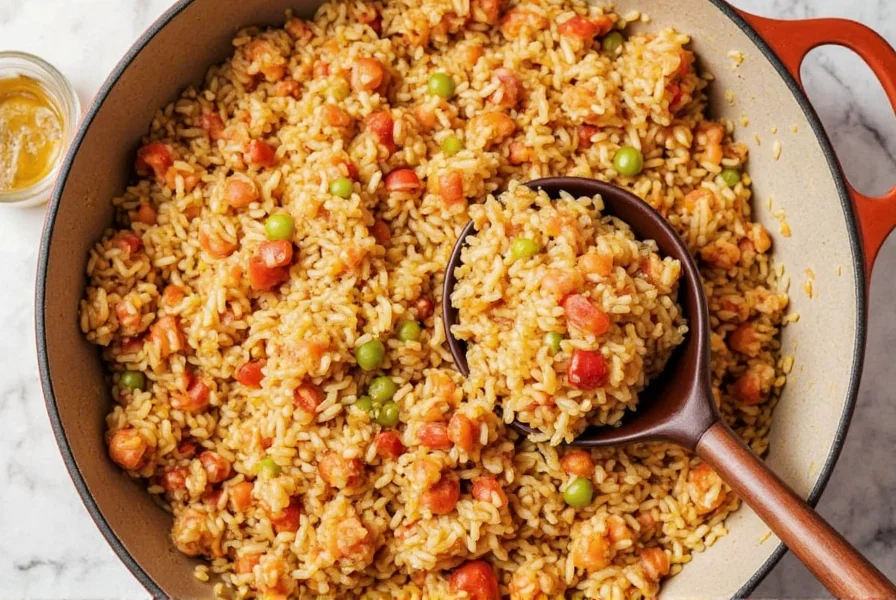
The best rice for jambalaya is long-grain white rice, which provides the perfect balance of texture and flavor absorption for this iconic Southern dish. As a Cajun chef with over 20 years of experience, I've perfected jambalaya recipes that consistently delight diners. According to the Louisiana State University AgCenter, long-grain white rice is the traditional choice for authentic jambalaya, offering the ideal texture and flavor absorption.
Why Rice Choice Matters in Jambalaya
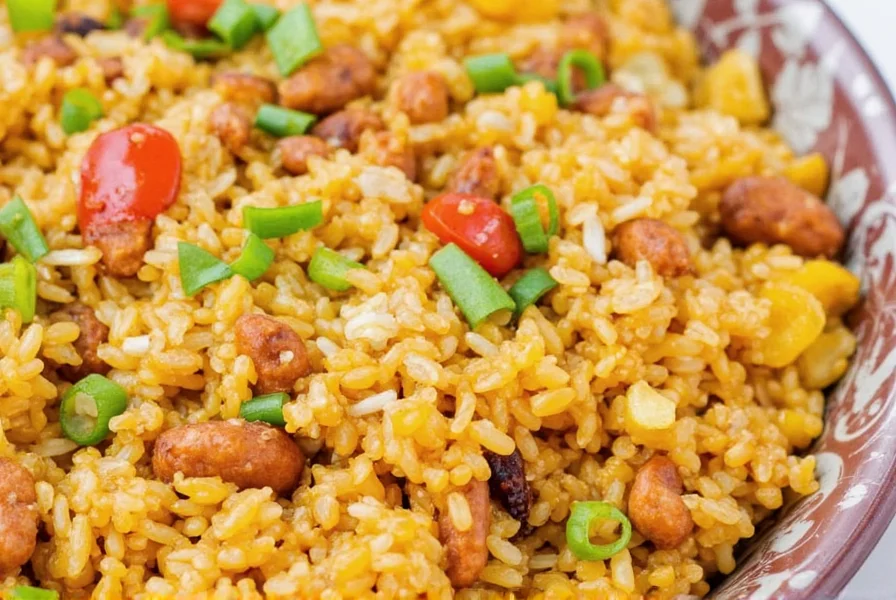
Rice isn't just a filler in jambalaya—it's the canvas upon which the bold flavors of smoked sausage, shrimp, chicken, tomatoes, peppers, and Cajun spices dance. The right rice soaks up all those complex flavors without drowning in them, providing texture contrast and mouthfeel magic. Too soft? Mushy mess. Too hard? Unappetizing crunch. So what makes a rice ideal for jambalaya?
The Ideal Rice for Jambalaya Must:
- Have a firm texture that holds up during long simmering
- Absorb broth and spice flavors without falling apart
- Cook evenly and consistently every time
Top 5 Rice Varieties for Perfect Jambalaya
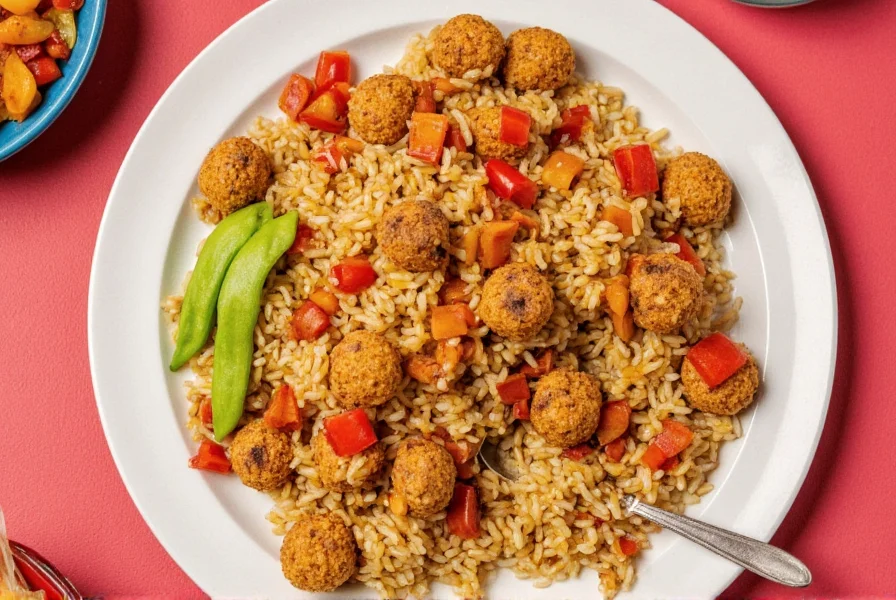
Here's a breakdown of the top five rices that will make your jambalaya sing:
| Rice Type | Texture | Flavor Absorption | Best For |
|---|---|---|---|
| Long-Grain White Rice | Firm & separate | Moderate | Classic jambalaya recipes |
| Basmati Rice | Fragrant & fluffy | High | Spicy or exotic twists |
| Jasmine Rice | Soft & sticky | High | Richer, creamier styles |
| Arborio Rice | Creamy & rich | Very high | Risotto-style jambalaya |
| Brown Rice | Nutty & chewy | Moderate | Healthy versions |
Spice Storage Tips to Keep Your Flavors Fresh
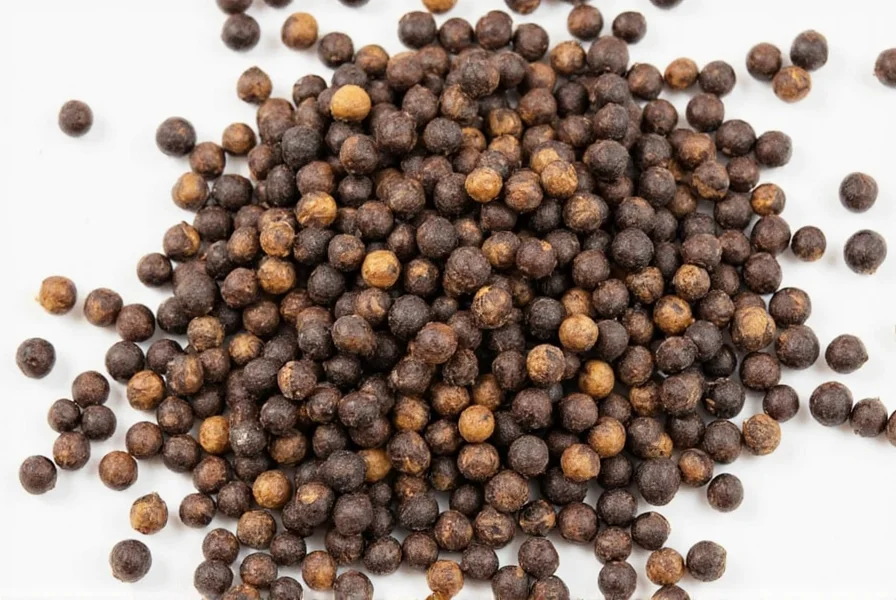
If your jambalaya tastes like a ghost town, your spices might be to blame. Proper spice storage can make or break your flavor profile. Here are some pro tips to keep your spices vibrant and ready to party:
- Air-tight containers: Store spices in glass or metal jars to protect from moisture and air exposure.
- Cool, dark place: Sunlight and heat degrade potency. Avoid placing near stoves or windows.
- Label everything: Use dated labels so you know when to replace older spices (usually after 6–12 months).
- Avoid contamination: Never dip wet spoons into spice jars. It introduces moisture and bacteria.
7 Genius Rice Hacks for Flavor-Packed Jambalaya
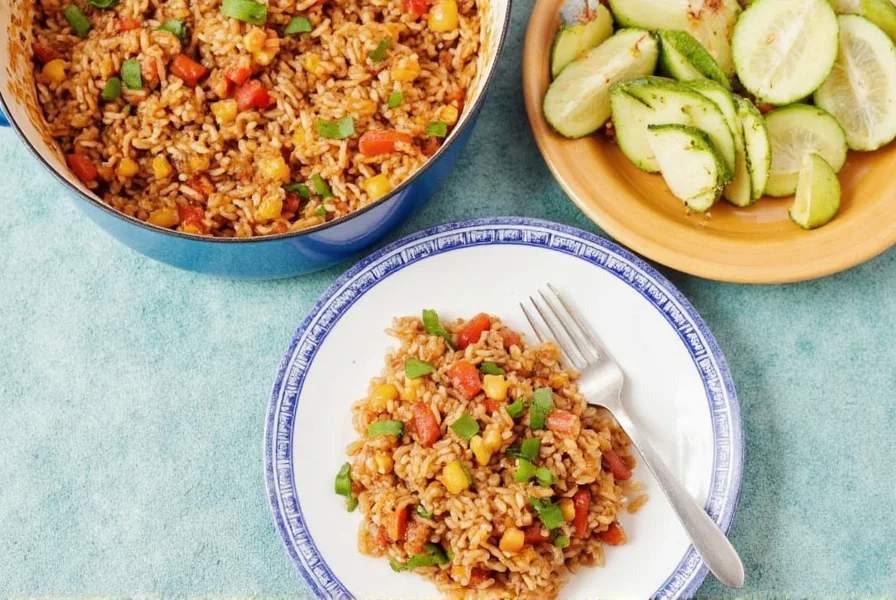
Ready to level up your jambalaya? Try these clever tricks to turn ordinary rice into a flavor powerhouse:
- Toasted Rice: Toast your rice before adding liquid. It brings out nutty notes and prevents sticking.
- Broth Infusion: Swap water for homemade or store-bought chicken or seafood broth to boost depth of flavor.
- Lemon Zest Kick: Add a touch of lemon zest to the rice before cooking for a refreshing pop.
- Garlic Butter Boost: Stir in a bit of garlic butter after cooking for a creamy finish.
- Parboil Magic: Parboil rice before finishing in the pan with the jambalaya mixture to ensure perfect doneness.
- Coconut Rice Twist: Replace regular broth with coconut milk for a tropical-inspired jambalaya variation.
- Herb Sprinkle: Finish with fresh chopped parsley or cilantro for brightness and visual appeal.
How to Buy the Best Rice for Jambalaya
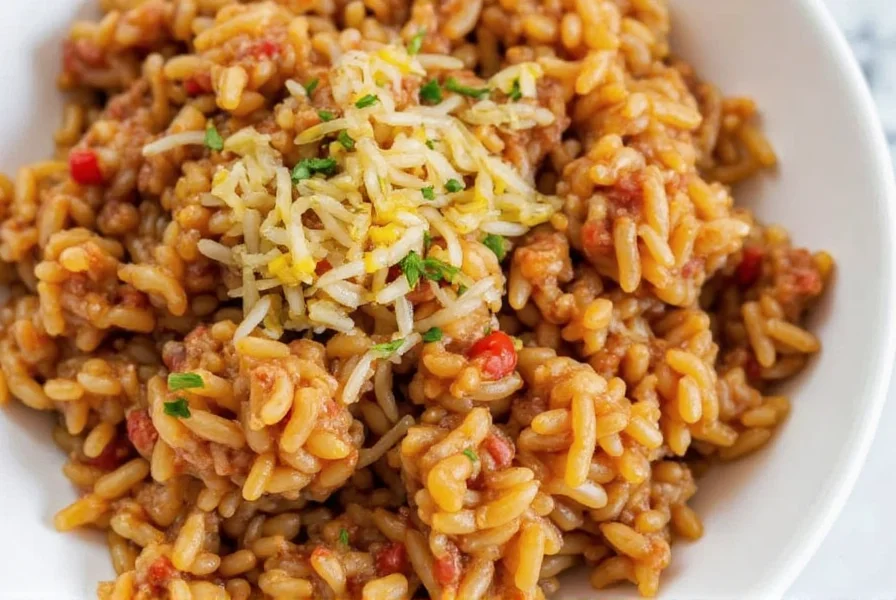
Choosing the right rice can feel overwhelming. Here's your ultimate buying guide to ensure every grain works as hard as you do in the kitchen:
Key Features to Look For
- Type: Long-grain preferred for traditional jambalaya; Arborio for creamier textures.
- Age: Fresher rice tends to cook better and retain structure.
- Packaging: Choose resealable bags or vacuum-sealed pouches for longer shelf life.
- Brand Reputation: Stick to trusted brands known for quality rice like Uncle Ben's, Lundberg, or Tilda.
Who Should Buy What?
| User Type | Recommended Rice | Use Case |
|---|---|---|
| Beginner Home Cooks | Uncle Ben's Converted Rice | Easier to handle and forgiving |
| Experienced Chefs | Arborio Risotto Rice | For advanced jambalaya variations |
| Health Enthusiasts | Organic Brown Rice | Lower glycemic index and more fiber |
| Flavor Chasers | Jasmine or Basmati Rice | Adds aromatic dimension |
Frequently Asked Questions About Rice for Jambalaya

What's the best rice for traditional jambalaya?
Long-grain white rice is the gold standard for traditional jambalaya. Its firm texture holds up well during the cooking process while still absorbing flavors beautifully. Brands like Carolina or Mahatma long-grain white rice work perfectly, giving you those distinct separate grains that are characteristic of authentic Creole and Cajun jambalaya. According to the Louisiana State University AgCenter, long-grain white rice is the traditional choice for authentic jambalaya, offering the ideal texture and flavor absorption.
Can I use brown rice in jambalaya?
Yes, but with adjustments. Brown rice requires about 50% more liquid and 20-30 minutes longer cooking time than white rice. For best results, partially cook brown rice separately before adding to your jambalaya mixture. This prevents the other ingredients from overcooking while the rice finishes. The nutty flavor of brown rice adds a wonderful dimension to healthier versions of this classic dish.
Why is my jambalaya rice always mushy?
Mushy rice typically happens for three reasons: using too much liquid, overcooking, or choosing a rice variety with too much starch. For perfect texture, maintain a 1.5:1 liquid-to-rice ratio, avoid stirring too frequently (which releases starch), and consider toasting your rice in oil before adding liquid. Long-grain varieties naturally have less starch than short or medium-grain options, making them less prone to becoming mushy.
How much rice should I use in jambalaya?
The ideal ratio is 1 cup of uncooked rice to 1.5 cups of liquid for most long-grain varieties. For a standard family-sized jambalaya (serving 4-6 people), use 1.5 cups of rice with 2.25 cups of broth. Remember that rice absorbs liquid and expands during cooking, so measure your uncooked rice carefully. Too much rice will make your jambalaya dry, while too little will result in a soupy dish.
Should I rinse rice before making jambalaya?
For most long-grain white rices, rinsing is recommended to remove excess surface starch that can cause stickiness. However, if using converted (parboiled) rice like Uncle Ben's, rinsing isn't necessary as the parboiling process has already stabilized the starch. If you're toasting your rice before cooking (a recommended technique), rinsing becomes essential to prevent burning from excess starch.
Can I make jambalaya ahead of time with the rice already cooked?
It's best to cook the rice as part of the jambalaya process rather than adding pre-cooked rice. The magic happens when the rice absorbs the flavorful broth and spices while cooking. If preparing ahead, make the jambalaya base (meats, vegetables, spices) in advance, then add fresh rice and liquid when you're ready to serve. Leftover jambalaya often becomes too dry when reheated because the rice continues absorbing liquid, so having a little extra broth on hand for reheating is wise.
Conclusion: Let Your Rice Sing in Every Bite
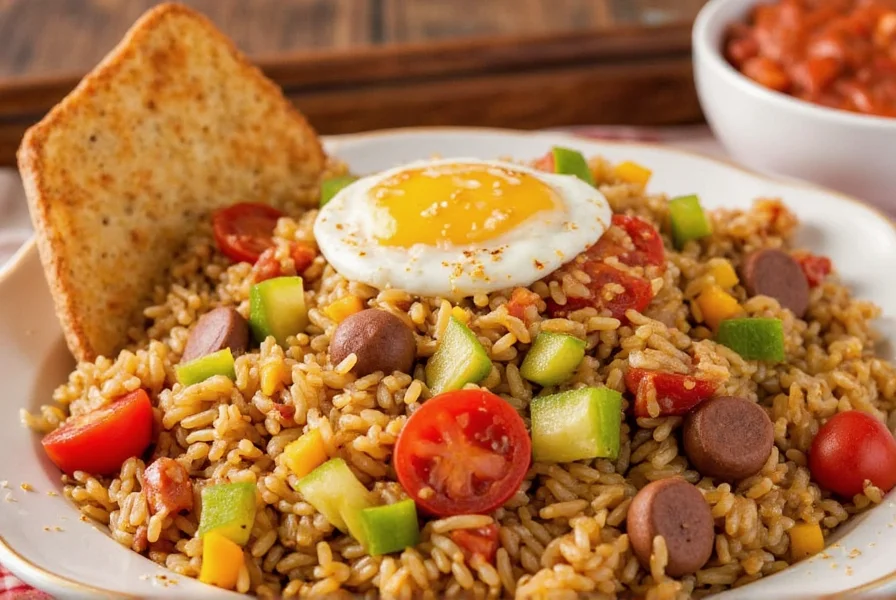
Jambalaya is more than a one-pot wonder—it's a celebration of culture, spice, and tradition. And at its heart is perfectly cooked rice that ties everything together. With the right type of rice, smart spice storage habits, and a few insider hacks, you can take your jambalaya from good to unforgettable. Whether you're hosting a dinner party or just craving something comforting, remember: the secret ingredient is always in the rice.
Now go forth and let your rice shine!

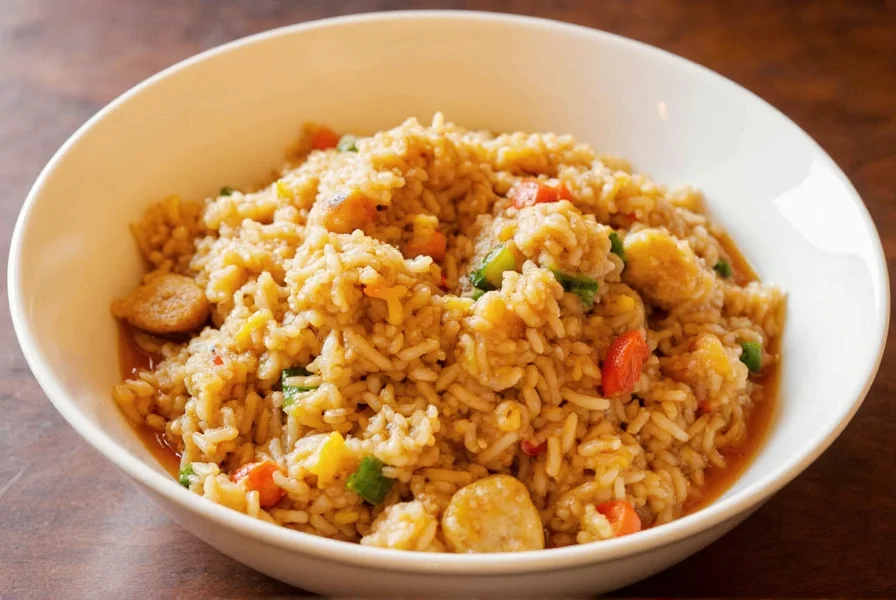









 浙公网安备
33010002000092号
浙公网安备
33010002000092号 浙B2-20120091-4
浙B2-20120091-4